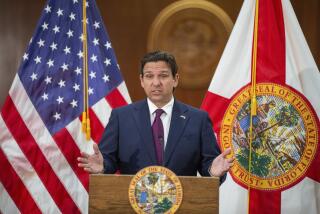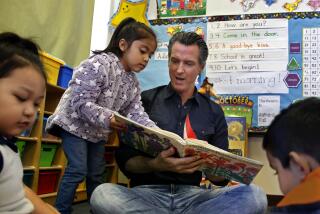Obama, Jeb Bush make strange bedfellows at Florida school event
Reporting from Miami and Washington — President Obama on Friday celebrated a South Florida experimental school project with former Florida Gov. Jeb Bush, who is blamed by many teachers in this state for threatening their jobs.
The president tried to strike a bipartisan chord at Miami Central Senior High School, touting its dramatic turnaround and underscoring the importance of federal investment in education at a time when almost every domestic program sits atop a congressional chopping block.
Obama was welcomed with a deafening roar from the more than 800 students in the school’s gymnasium.
But his decision to appear with Bush, viewed as a principal Republican driver of education reform in Florida and nationwide, didn’t sit well with about 500 area teachers who mounted a demonstration outside the school, located in a well-worn neighborhood about six miles north of downtown Miami.
“We were dismayed that President Obama would choose to be at Central Senior High with former Gov. Bush, who worked to close this very school,” said Karen Aronowitz, president of the local teachers union.
Bush, she said, “supports legislation to break our unions and silence our teachers.”
One protester held up a sign that read: “Mr. President, You Didn’t Do Your Homework.”
When Bush became governor in 1999, he pushed for charter schools, standardized tests and tying teacher pay to performance. Obama also has supported charter schools and teacher accountability.
Bush said as he introduced the president: “There’s a lot more to do. Educational achievement is not a Republican issue or a Democrat issue.”
While advocating his proposal to freeze domestic spending for five years — which has been rejected as insufficient by Republicans on Capitol Hill — Obama said funds for education must be spared.
“I want everybody to understand, our job is not just to cut,” the president said. “Even as we find ways to cut spending, what we can’t do is cut back on investments like education.”
Miami Central Senior High was held up by the president as a model for his education reform policy. It was rated a failing school under the criteria of the No Child Left Behind Act, which is up for reauthorization this year, and was nearly shuttered.
With help from a $785,000 federal grant, a new principal was brought to Miami Central, students were moved into a new facility and half of the faculty was sent elsewhere. Now the school is showing gains in math and reading. The school is safer and the graduation rate has almost doubled.
Obama’s 2012 budget calls for an 11% increase for the Department of Education. Over the next month, the president will be traveling the country to talk up education investment. On Tuesday, he’ll speak in Boston.
“I am not willing to give up on any child in America. I am not willing to give up any school in America,” he told the crowd.
The president did not refer to the union controversy in Wisconsin, where Republican Gov. Scott Walker is locked in a battle with teachers unions over collective-bargaining rights. But Obama did note that “replacing some teachers” was a key in turning Miami Central around. He said those teachers were removed with the support of the local unions.
Education Secretary Arne Duncan, who also attended the Miami event, said the decision to appear with Bush was an example of Obama’s bipartisan approach to education policy.
“We all have to work together,” Duncan said. “Working across the aisle, regardless of politics, is important.”
On his arrival in Florida from Washington, Obama was met on the tarmac by Florida’s new Republican governor, Rick Scott, one of his most vocal critics.
Scott is championing a bill in the Florida Legislature that would take the state’s educational overhaul efforts further and make at least half of a teacher’s salary dependent on students’ performance on standardized tests. A similar bill was vetoed last year by then-Gov. Charlie Crist, a Republican who later became an independent.
More to Read
Get the L.A. Times Politics newsletter
Deeply reported insights into legislation, politics and policy from Sacramento, Washington and beyond. In your inbox three times per week.
You may occasionally receive promotional content from the Los Angeles Times.











